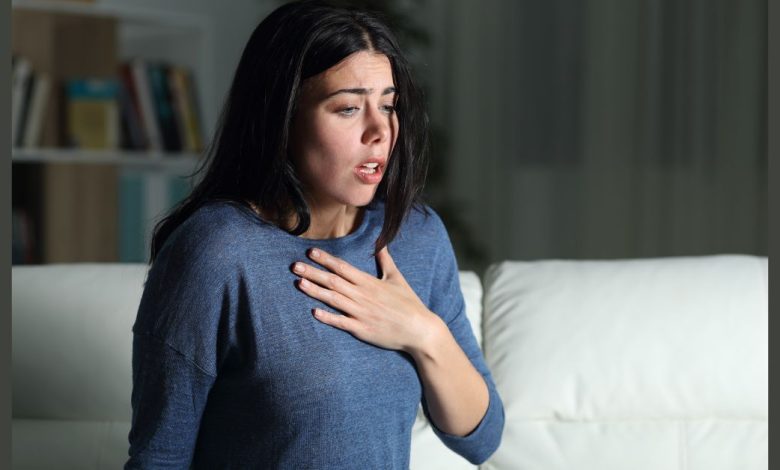Hyperventilation, intense breathing: what is this, causes, symptoms, diagnostics, treatment, prevention

Hyperventilation; Rapid deep breathing; Breathing – rapid and deep; Overbreathing; Fast deep breathing; Respiratory rate – rapid and deep; Hyperventilation syndrome; Panic attack – hyperventilation; Anxiety – hyperventilation
Hyperventilation is a sudden, excessive and rapid breathing, which causes too rapid loss of carbon dioxide (CO2). This leads to an imbalance in the pH of the blood., causing it to become too alkaline. This condition is also called hypocapnia or alkalosis.. Hyperventilation can be caused by certain medical conditions, physical stress, sudden emotional breakdown, medication, medicines and diseases of the respiratory system. This can happen as an isolated event, or it may be recurrent and chronic.
you breathe in oxygen, and exhale carbon dioxide. Excessive breathing creates low levels of carbon dioxide in the blood. It causes many of the symptoms of hyperventilation.
You may be breathing fast for an emotional reason, eg, during a panic attack. Or it could be related to a medical problem, such as bleeding or infection.
The attending physician will determine the cause of hyperventilation. Rapid breathing may be a medical emergency, and you need to undergo treatment, unless you've experienced it before and your doctor has told you, that you can cure it yourself.
If you are constantly inhaling air, you may have a medical problem, called hyperventilation syndrome.
When you are breathing fast, you may not realize, that breathe quickly and deeply. But you, probably, you will feel other symptoms, including:
- Feeling dizzy, weakness or inability to think clearly
- Feeling, like you can't catch your breath
- Chest pain or fast and strong heartbeat
- Belching or bloating
- Dry mouth
- Muscle spasms in arms and legs
- Numbness and tingling in the hands or around the mouth
- Sleeping problems
Causes of hyperventilation
Emotional reasons include:
- Anxiety and nervousness
- Panic attack
- Situation, when sudden, the disease affects the psyche (eg, somatization disorder)
- Stress
Medical reasons include:
- Bleeding
- Problems with heart, such as heart failure or heart attack
- Taking certain medications (eg, aspirin overdose)
- Infection, such as pneumonia or sepsis
- Ketoacidosis and other diseases, causing excess acid production in the body.
- Lung disease, such as asthma , COPD or pulmonary embolism
- Pregnancy
- Strong pain
- Stimulant drugs
Home care for hyperventilation
Your doctor will examine you for other causes of intense breathing.
If the doctor said, that hyperventilation is caused by anxiety, stress or panic, there are steps, things you can do at home. You, your friends and family can learn how to prevent similar attacks and future attacks.
If you are hyperventilating, the goal is, to raise the level of carbon dioxide in the blood. This will put an end to most of your symptoms.. Ways to do this include:
- Ask a friend or family member to calm your breath. Words like this help a lot., like "you're fine", "you don't have a heart attack" and "you won't die". Very important, for the person to remain calm and speak softly, relaxed tone.
- To increase carbon dioxide levels, learn to breathe with pursed lips . This is done by wrinkling the lips., as if you are blowing out a candle, and then exhale slowly through your lips.
If you have been diagnosed with anxiety or panic attacks, see a mental health professional, which will help you understand and treat your condition.
- Learn breathing exercises, to help you relax and breathe through your diaphragm and belly, not breast.
- Practice relaxation techniques, such as progressive muscle relaxation or meditation.
- Exercise regularly.
If these methods alone do not prevent intense breathing, the doctor may recommend medication.
When to See a Doctor for Hyperventilation
Contact your doctor, if:
- You have rapid breathing for the first time. You may need to call for emergency medical attention,.
- you are in pain, fever or bleeding.
- Your hyperventilation persists or worsens even with treatment.
- Do you also have other symptoms?.
What to Expect When Visiting a Doctor
The doctor will perform a physical exam and ask about your symptoms.
Your breath will also be checked.. If at this time you breathe more slowly, the doctor may try to induce hyperventilation, telling you to breathe a certain way. The doctor will then observe, how do you breathe, and check, what muscles do you use for breathing.
Tests, who may be assigned, include:
- Blood tests for oxygen and carbon dioxide levels in the blood
- Chest CT
- EKG to check the heart
- Lung ventilation/perfusion scan to measure respiration and pulmonary circulation
- Chest X-ray
Prevention of hyperventilation
Hyperventilation can be prevented or minimized, coping with stress, reducing smoking or drinking alcohol, identifying and avoiding hyperventilation triggers and seeking medical attention as needed. Understanding, how hyperventilation works, may also help people learn to better recognize symptoms and take steps to prevent further episodes.
It is important to note, that hyperventilation is not always involuntary and can be used consciously to reduce stress and anxiety. However, it should only be used for short periods and only by properly trained people., as it can lead to other health problems. People, who think, who may be at risk of hyperventilation, should consult with your doctor, to identify, how to manage your condition.
Used literature and sources
Braithwaite SA, Wessel AL. Dyspnea. In: Walls RM, ed. Rosen’s Emergency Medicine: Concepts and Clinical Practice. 10th ed. Philadelphia, PA: Elsevier; 2023:chap 21.
Schwartzstein RM, Adams L. Dyspnea. In: Broaddus VC, Serious JD, King TE, et al, eds. Murray and Nadel’s Textbook of Respiratory Medicine. 7th ed. Philadelphia, PA: Elsevier; 2022:chap 36.
